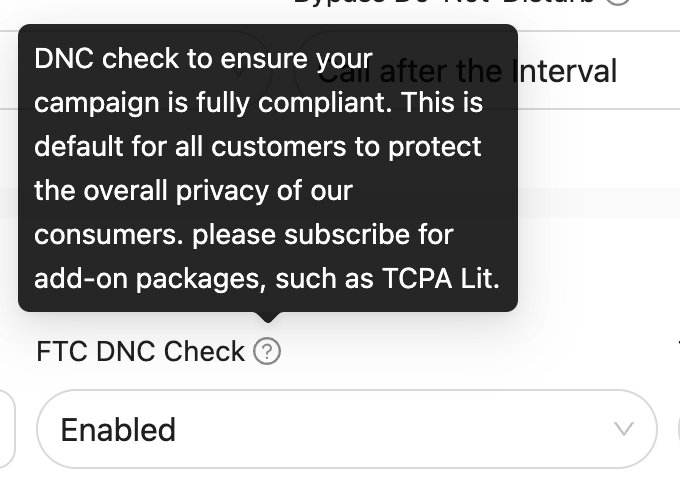DNC
Taalk incorporates a built-in Do-Not-Call (DNC) list and rigorously checks each outgoing phone call to ensure compliance with the Telephone Consumer Protection Act (TCPA). This commitment helps protect consumers from unwanted telemarketing calls and ensures your campaigns comply with legal standards.
Key Features of Taalk’s DNC Compliance:
-
Automated DNC Checks: Every phone number dialed through Taalk is automatically cross-referenced against the DNC list to prevent communication with individuals who have opted out of receiving marketing calls.
-
Real-time DNC Updates: Our DNC list is continuously updated to reflect new registrations and changes, ensuring that our compliance is always current.
-
Custom (Campaign) DNC: Users have the capability to manually add contacts to the DNC list via Taalk. This feature allows for greater control and customization, ensuring that your specific non-contact preferences are respected.
-
Taalk Agent DNC Detection: Taalk’s AI technology dynamically detects when a contact requests removal from the list during an interaction. This advanced feature automatically updates the DNC status, enhancing compliance and maintaining up-to-date contact preferences.
The Do-Not-Call Registry, managed by the Federal Trade Commission (FTC), allows consumers to opt out of receiving most telemarketing calls. By registering their phone number, individuals can significantly reduce the number of unsolicited calls they receive. This registry is crucial for businesses to follow to avoid penalties and uphold consumer privacy.
For more information on the Do-Not-Call Registry and guidelines, you can visit the FTC’s DNC page.
By integrating these compliance measures, Taalk ensures that your campaigns operate within legal guidelines and respect consumer preferences, enhancing the effectiveness and ethical standards of your outreach efforts.

TCPA Representation and Indemnification
Customer shall be responsible for complying with all laws applicable to its emails, calls and other communication (“Communication”), including those related to acquiring consents to send Communication, the content of the Communications and its Communication deployment practices. Such applicable laws include but are not limited to those pertaining to intellectual property rights, the CAN SPAM Act of 2003, the Telephone Consumer Protection Act, anti-corruption or anti-bribery laws or other applicable laws, statutes, rules or regulations of the United States or of those of any jurisdiction into which any email addresses are collected or Communication sent. Customer acknowledges that CAN SPAM Act of 2003 prohibits the transmission of unsolicited messages to unknown individuals in bulk, or to individuals who have opted out of receiving such messages or content. Company may take remedial action should Customer violate CAN SPAM, the Telephone Consumer Protection Act, or other applicable law and such remedial action may include suspension of Services provided under this Agreement. Company shall have the right, but not the obligation, to monitor at any time, for any reason at its sole discretion, all material and content in the Communication in order to determine compliance with this Agreement or applicable law; however, Company shall not be responsible for nor shall it have any obligation to, monitor the Communication or any content in the Communication. The parties acknowledge and agree that Customer, not Company, is responsible for any TCPA compliance with respect to Leads and Content. Company does not represent or warrant that the Leads or Content will comply with the requirements of the TCPA, nor is it obligated to retain or store evidence of Consumer’s acceptance of any TCPA-related disclosure.
Updated 4 months ago
